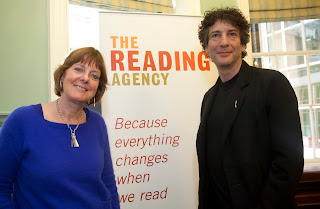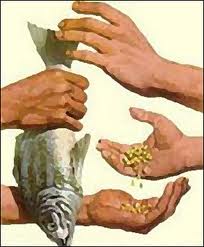Neil Gaiman On the Importance of Reading, Libraries and Daydreaming
"Well meaning adults can easily destroy a child's love of reading - do not discourage children from reading because you feel they're reading the wrong thing. There is no such thing as the wrong thing to be reading and no bad fiction for kids." - Neil Gaiman
(The following is Neil Gaiman's speech during the The Reading Agency's annual lecture held on October 14, 2013)
It's
important for people to tell you what side they are on and why, and whether
they might be biased. A declaration of members' interests, of a sort. So, I am
going to be talking to you about reading. I'm going to tell you that libraries are
important. I'm going to suggest that reading fiction,
that reading for pleasure, is one of the most important things one can do. I'm
going to make an impassioned plea for people to understand what libraries and librarians
are, and to preserve both of these things.
And I am biased, obviously and enormously: I'm an author,
often an author of fiction. I write for children and for adults. For about 30
years I have been earning my living though my words, mostly by making things up
and writing them down. It is obviously in my interest for people to read, for
them to read fiction, for libraries and librarians to exist and help foster a
love of reading and places in which reading can occur.
So I'm biased as a writer. But I am much, much more biased
as a reader. And I am even more biased as a British citizen.
And I'm here giving this talk tonight, under the auspices
of the Reading Agency: a charity whose mission is to give everyone an equal
chance in life by helping people become confident and enthusiastic readers.
Which supports literacy programs, and libraries and individuals and nakedly and
wantonly encourages the act of reading. Because, they tell us, everything
changes when we read.
And it's that change, and that act of reading that I'm
here to talk about tonight. I want to talk about what reading does. What it's
good for.
I was once in New York, and I listened to a talk about the
building of private prisons – a huge growth industry in America. The prison
industry needs to plan its future growth – how many cells are they going to
need? How many prisoners are there going to be, 15 years from now? And they
found they could predict it very easily, using a pretty simple algorithm, based
on asking what percentage of 10 and 11-year-olds couldn't read. And certainly
couldn't read for pleasure.
It's not one to one: you can't say that a literate society
has no criminality. But there are very real correlations.
And I think some of those correlations, the simplest, come
from something very simple. Literate people read fiction.
Fiction has two uses. Firstly, it's a gateway drug to
reading. The drive to know what happens next, to want to turn the page, the
need to keep going, even if it's hard, because someone's in trouble and you
have to know how it's all going to end … that's a very real drive. And it
forces you to learn new words, to think new thoughts, to keep going. To
discover that reading per se is pleasurable. Once you learn that, you're on the
road to reading everything. And reading is key. There were noises made briefly,
a few years ago, about the idea that we were living in a post-literate world,
in which the ability to make sense out of written words was somehow redundant,
but those days are gone: words are more important than they ever were: we
navigate the world with words, and as the world slips onto the web, we need to
follow, to communicate and to comprehend what we are reading. People who cannot
understand each other cannot exchange ideas, cannot communicate, and translation
programs only go so far.
The simplest way to make sure that we
raise literate children is to teach them to read, and to show them that reading
is a pleasurable activity. And that means, at its simplest, finding books that
they enjoy, giving them access to those books, and letting them read them.
I don't think there is such a thing as a bad book for
children. Every now and again it becomes fashionable among some adults to point
at a subset of children's books, a genre, perhaps, or an author, and to declare
them bad books, books that children should be stopped from reading. I've seen
it happen over and over; Enid Blyton was declared a bad author, so was RL
Stine, so were dozens of others. Comics have been decried as fostering
illiteracy.
It's tosh. It's snobbery and it's foolishness. There are no bad authors for children, that children like and want to read and seek out, because every child is different. They can find the stories they need to, and they bring themselves to stories. A hackneyed, worn-out idea isn't hackneyed and worn out to them. This is the first time the child has encountered it. Do not discourage children from reading because you feel they are reading the wrong thing. Fiction you do not like is a route to other books you may prefer. And not everyone has the same taste as you.
Well-meaning adults can easily destroy
a child's love of reading: stop them reading what they enjoy, or give them
worthy-but-dull books that you like, the 21st-century equivalents of Victorian
"improving" literature. You'll wind up with a generation convinced
that reading is uncool and worse, unpleasant.
Continue reading here: http://www.theguardian.com/books/2013/oct/15/neil-gaiman-future-libraries-reading-daydreaming?CMP=twt_gu




Comments
Post a Comment
So, what do you think? Post it here: